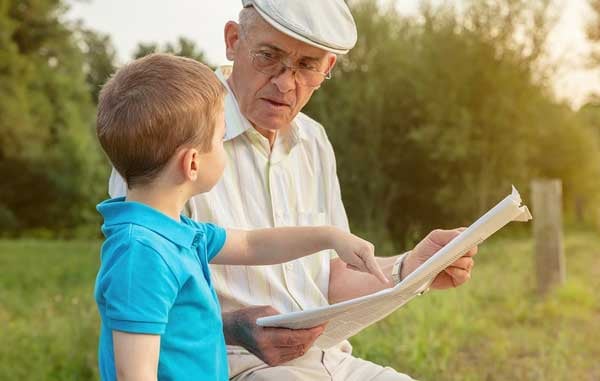A third of today's youth lack mentors, according to a report from mentoring.org. Countless older adults, meanwhile, are isolated, lonely and in need of companionship. What do you get when you combine the two? Profound opportunities for healthier, happier kids, seniors, and communities.
What better time to take a closer look at multigenerational mentorship than during January's National Mentoring Month? Read on to learn more about the many mutually beneficial outcomes of senior-youth mentorship relationships, along with how to find opportunities for getting involved in your area.
 Mentorships between kids and seniors are a natural, if underutilized, fit.
Mentorships between kids and seniors are a natural, if underutilized, fit.
Why Mentor?
An abundance of research indicates that young people derive many positive effects from participating in mentoring relationships. How much so? According to a study of nearly 1,000 youth at Big Brothers Big Sisters, kids with mentors are not only significantly less likely to use illegal drugs and alcohol, skip school, and get into physical fights, but they are also more confident about academics and social relationships.
In response to the importance of mentorship, the Harvard T.H. Chan School of Public Health and MENTOR: The National Mentoring Partnership joined forces in 2002 to create National Mentoring Month to raise awareness about the value of mentors.
Why Seniors?
Any adult can be a mentor, but seniors are particularly positioned to make unique contributions. Not only do they have plenty of wisdom and experience to share, but their potential is often undervalued and underutilized. Mentorship puts these untapped resources to good use.
Factor in that seniors are living longer, are healthier than ever before, and growing in number, and they become the perfect candidates for filling key mentorship roles within their own communities. And it works: The attention, guidance, and support of seniors has been proven to help at-risk kids become more aware, self-confident and capable people.
The benefits hardly go one way. Older adults can also derive fulfillment as well as a sense of value and purpose which is often otherwise lacking in the senior years. This mentoring relationship can also help with depression and loneliness and improve the overall quality of life for seniors.
Finding Intergenerational Mentoring Programs
While mentorship relationships can happen naturally, they are also facilitated through organizations aimed at building bridges between seniors and youth.
Consider Senior Corps' Foster Grandparent Program. This national service program unites older Americans with at-risk kids in their local communities to act as mentors, tutors, and caregivers. Currently, more than 30,000 "foster grandparents" serve as mentors for approximately 275,000 kids.
Not sure where to find a program? Check in with your local community center or National Area Agency on Aging to find out about opportunities for senior volunteering and mentorship.
Today's kids face many challenges, and too often are forced to try to navigate these obstacles alone. Today's seniors, meanwhile, have faced many of those challenges and overcome them, and yet have no means through which to share their experiences. Mentoring offers the perfect opportunity for the young and older adult to connect and benefit in unique ways. Not only do kids gain access to the support they need, but seniors also thrive when given the chance to make a difference.
.jpg)
People -- and communities -- grow stronger through mentorship.
If you're looking for a comprehensive resource for family caregivers, check out our online Family Caregiver Guide.mmLearn.org offers a large library of free videos for caregivers of older adults, covering topics pertaining to senior care. Whether you are a healthcare professional or a family caregiver, if you are caring for an older adult we know that you will find mmLearn.org an essential learning and guidance tool for all of your caregiver training needs. For more useful information on senior topics, access our free online caregiver videos.
